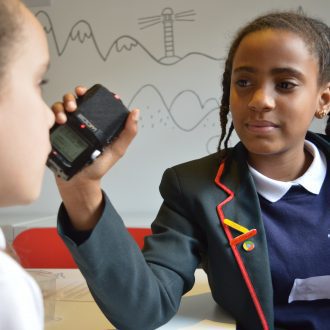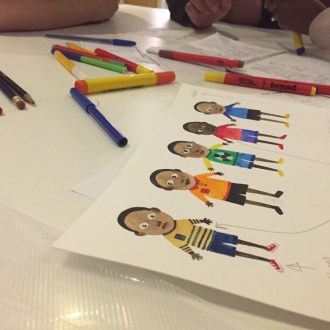Pep up Children’s Poetry with Simon Mole
Guest blogger Simon Mole shares tips and videos he’s made to inspire creativity in his writing workshops with children.
Simon Mole writes poems about ninja skeletons, raps about pug dogs playing football, stories about boys who meet Pacman and girls who can’t stop drumming. He was the first Poet Laureate for the London borough of Brent, and is a member of the acclaimed poetry collective Chill Pill. Since becoming a father Simon has written increasingly for young people, and his first play for children and families was commissioned by the V&A in 2016; ‘Friends For All’ is touring with Half Moon Theatre.
Simon has over a decade’s experience using poetry and rap with young people of all ages, and in February 2017 he launched a free, online poetry resource for teachers, kids and parents. In this blog he talks us through how to use some of the interactive video content with primary aged children.
Intro:
This funny rap has proved a big hit in countless other schools, particularly as a way to quickly engage kids who might think poetry is boring, but like rap or hip hop music.
Once you’ve watched the video, you could chat through what they liked about it; get them to be as specific as they can. Why was it good? Which bit was funny? Was there anything that stood out which they remember? Then ask for suggestions for improvements, or things they would have changed.
Warm up:
The game works well with all ability levels, but is particularly helpful for getting less confident or reluctant writers started. The activity will help children say yes to their own ideas, and support them to keep their critical inner voice quiet – but also remind them that the very same voice will be useful later on when editing.
Writing:
After a pretty silly intro section this video focuses on quickly generating ideas, and takes young writers through a series of simple prompts to write a poem which brings an emotion to life using sensory descriptive language.
Each time you pause the video, it will help to remind the group of the main prompt and then remind them to be as specific as they can with their answers. Don’t write the question! Write only the answer.
Sharing:
Once you’ve finished some or all of the kids could now read out their poems, or some of the writing that they like or feel proud of.
Make sure to establish what a good audience does before you start – perhaps focus on the difference between being quiet, and listening.
Once people have performed, I like to pick specific elements of each piece to praise. Remember to make clear what a big achievement it is to write and perform your own poetry in this way!
If you would like to get in touch with Simon, email him at: simonmolespokenword@gmail.com








